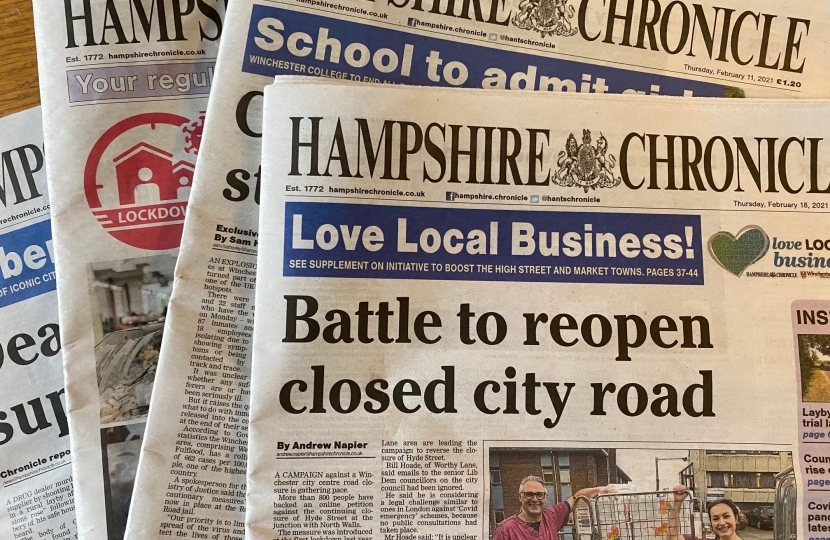
We have, in recent weeks, announced details of almost three thousand organisations being offered grants and loans to help the culture and heritage sector reopen and recover from Covid.
As a member of the Digital, Culture, Media & Sport Select Committee, I have taken a very close interest in the Culture Recovery Fund (worth some £1.57 billion of public money) but as our constituency MP, I’ve watched it like a hawk.
Last year our area did well from the fund and I know many of our most valued institutions received lifeline financial support. It was well covered at the time in this newspaper of course.
This month, in tranche two of the CRF, some £1.8m in further grants were awarded to local organisations including Winchester Cathedral, Theatre Royal, Mid Hants Watercress Line Railway, Integr8 Dance, Unit 12 in Winnall and the much-loved Railway Inn in Winchester.
Working with the Live Music Trust I have taken special interest in this one because these grassroots music venues are the very heart of our world-beating music industry. All of these local treasures are, I know, really grateful for the support and many have even said so.
I realise, for some, it may be questionable to spend vast sums of public money on theatres and ‘fun’ but we have taken the view from the start that we must have a strong society to return to post-pandemic.
And, of course, tens of thousands of freelancers rely on the creative industries for a living so it matters and I am proud my Government has stood with the sector.
This is state interventionism and to my mind it’s well-placed - from national Government. The Culture Recovery Fund (administered via Arts Council England) like the phenomenal Vaccine Taskforce, led by Kate Bingham, is a lesson in statecraft for which the Prime Minister deserves credit.
He understood you make the funds available, set a clear course and let those who know what they’re doing get on with it.
Well-directed interventionism here - from local Government - would be welcome too but we need a step change to make it count.
Last year (much to the irritation of some for whom it perhaps rang a little too true) I said in this column that the future of work is one example that presents great opportunity for Winchester as we emerge from the pandemic.
But I questioned whether ‘we have the vision, local leadership and ambition’ to grab it and steal a march on our competitors. My question remains, more so than before.
My central thesis then, as now, is that Winchester can no longer afford to indulge in perpetual debate and self-interested legal challenge because the changing workplace is now.
Winchester still lacks a bold coherent strategy to be an exciting workplace destination that understands there’s a place for us between the (part-time) return to the office and the need to let the kitchen table be the kitchen table again.
The city centre is changing and newly available, former retail, space presents an opportunity for that intervention that gives new inspiration to the private sector to invest. One follows the other.
Expensive consultants second guessed by (albeit well-meaning) officers and councillors are not going to cut it; they’re one great win for fans of treading water and doing anything for fear of upsetting anyone.
Let’s be honest and admit; wide-scale urban regeneration and economic strategy in a heritage city is a serious business and it requires serious people who know what they’re doing. Time to set a course and let the experts get on with it here too.
Steve Brine MP

